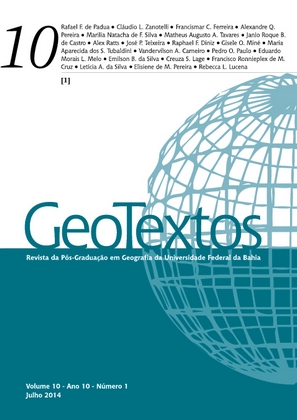CULTURAL QUILOMBOLA (RE)SIGNIFICATION AND (RE)INVENTION: THE AFRO-BRAZILIAN SPATIALITIES OF MARUJADA AND CURIANGO’S GROUP IN VALE DO JEQUITINHONHA-MINAS GERAIS-BRASIL
DOI:
https://doi.org/10.9771/1984-5537geo.v10i1.9954Keywords:
Quilombo, Cultural (re)signification and (re)invention, Marujada’s group, Curiango’s group, Vale do Jequitinhonha/MGAbstract
The year 1988 was an important landmark for afro-brazilian communities, when, for the first time, their constitutional rights were accorded to their land and exploitation of their cultural practices. Since then, several communities were internally reorganized and externally articulated in order to rescue and revitalize the celebrations, festivities and traditions inherited from their ancestors. In this context, this paper seeks to reflect about the processes of cultural (re)signification and (re)invention in the maroon communities of Moça Santa, municipality of Chapada do Norte and Quilombo, municipality of Minas Novas, in Vale do Jequitinhonha/MG. The rescue and recovery of dances, songs and celebrations locally regarded as “traditional”, like the Curiango’s group in Moça Santa, and the Marujada’s group in Quilombo, gained acceptance from the recognition of these territories as Quilombo, mobilizing youth and adults to practice and dissemination their cultural expressions. Through empirical observations and reports from the field, you realize that the Curiango and Marujada groups are important symbolic and cultural references of these territories, contributing to integration and community cohesion, for affirmation of his afro-brazilian identity, and especially, for legitimation of his self - recognition as Quilombo.Downloads
Downloads
Published
How to Cite
Issue
Section
License
Autores que publicam nesta revista concordam com os seguintes termos:
Autores mantém os direitos autorais e concedem à revista o direito de primeira publicação, com o artigo simultaneamente licenciado sob a Licença Creative Commons Creative Commons CC BY que permite o compartilhamento do trabalho com reconhecimento da autoria e publicação inicial nesta revista. Esta licença permite que outros distribuam, remixem, adaptem e criem a partir do seu trabalho, mesmo para fins comerciais, desde que lhe atribuam o devido crédito pela criação original. É a licença mais flexível de todas as licenças disponíveis. É recomendada para maximizar a disseminação e uso dos materiais licenciados. Ver o resumo da licença em: https://creativecommons.org/licenses/by/4.0/ Ver o texto legal da licença em: https://creativecommons.org/licenses/by/4.0/ Consulte o site do Creative Commons: https://creativecommons.org/licenses/?lang=pt
Autores têm autorização para assumir contratos adicionais separadamente, para distribuição não-exclusiva da versão do trabalho publicada nesta revista (ex.: publicar em repositório institucional ou como capítulo de livro), com reconhecimento de autoria e publicação inicial nesta revista.
Autores têm permissão e são estimulados a publicar e distribuir seu trabalho online (ex.: em repositórios institucionais ou na sua página pessoal) a qualquer ponto antes ou durante o processo editorial, já que isso pode gerar alterações produtivas, bem como aumentar o impacto e a citação do trabalho publicado (Veja O Efeito do Acesso Livre).






